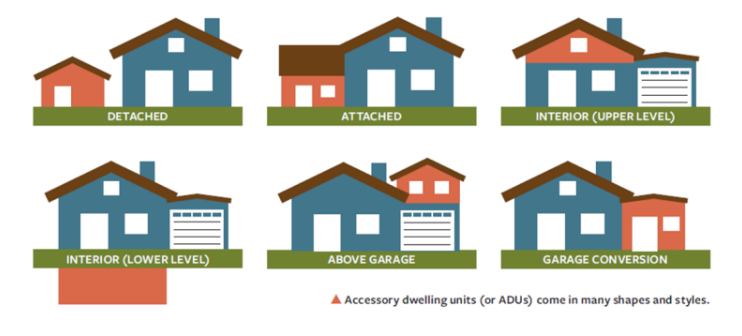AARP Hearing Center

Remember the “mother-in-law suite” or “granny flat”? These small, separate living spaces tucked behind a main house were once common in American neighborhoods. After World War II, they popped up across the country, offering families a way to keep loved ones close while giving them independence. However, over time, zoning laws made it increasingly difficult to build them, and they gradually faded from view.
Now, they’re making a comeback — and they’re called Accessory Dwelling Units, or ADUs. An ADU is a second unit built on the same lot as or within a single-family house. It might be a converted garage, a basement apartment, or a tiny house in the backyard.
The vast majority of people want to remain in their home or community as they age. For that to be reality, communities need to include a range of housing options that can fit people’s needs as they age. ADUs are one such option.
New Hampshire recently made significant updates to its state ADU laws that went into effect on July 1, 2025, expanding opportunities for Granite State homeowners and families to build ADUs more easily, especially as housing costs increase, and families seek better ways to care for aging relatives.
Here's a summary of the key changes and their implications for New Hampshire residents:
- ADUs are now allowed by right in all single-family zoning districts. No special exception or public hearing is needed, just a standard building permit. If your ADU meets design rules (e.g., height, size, setbacks, septic, watered), you can proceed directly with your local municipality.
- Both attached and detached ADUs are permitted — municipalities can no longer require an interior connection between units.
- Municipalities may not impose additional requirements (e.g., lot size, setbacks, design review, frontage) beyond what is required for a single-family home.
- One ADU per single-family dwelling is allowed. Municipalities are not required to permit more than one.
These changes remove many of the previous barriers that made ADU construction difficult or expensive, especially for families looking to house aging parents, adult children, or caregivers.
For older adults, ADUs offer the opportunity to age in place — to stay in the neighborhoods they know and love, even as their needs evolve.
Specifically, these changes make it easier for Granite Staters to:
- Build independent living spaces to enable caregivers and loved ones to live close by. – Family members or paid caregivers can move in to offer support. Such arrangements also help to reduce social isolation while maintaining privacy and independence.
- Create affordable housing options – Smaller units cost less than larger units and increasing the supply of housing can help to lower costs overall.
- Support aging in place with accessible, single-level living –ADUs can be designed for mobility, unlike many older homes that often feature stairs and narrow spaces.
- Generate retirement income through rentals—Generating income in retirement can help to improve financial security. Homeowners can either move into the smaller unit to reduce living expenses while generating income from renting the house or vice versa. In short, ADUs are more than just a housing trend. They’re a practical, flexible solution for families who want to stay together — whether that means caring for aging parents, supporting adult children, or simply creating a more affordable way to live.
Ready to explore ADUs for your family?
AARP has free tools to help you get started:
- Visit AARP.org/ADU for guides, videos, and planning tools.
- Explore real-life designs with the ADU Design Catalog.
- Try the ADU Decision Tool to see if it’s right for your family.
- Learn about zoning and financing with AARP housing experts.
As more communities adopt ADUs, we may see a resurgence of the kind of multigenerational living that was once common in America. And that’s good news for families, for neighborhoods, and for anyone who believes that home should be a place where people of all ages can thrive. So, whether you’re planning for a loved one’s future or your own, ADUs can help you stay close, stay safe, and stay home.































































